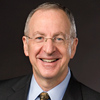The president is the chief executive and educational officer of the university and is charged with responsibility for providing general supervision over all affairs of the university. The president is elected by the Board of Trustees and, once elected, sits as an ex officio member of the board and of all its standing committees except the Audit Committee. Pursuant to university bylaws, the president is a member of every faculty and every separate academic unit of the university.
Cornell is served by a provost in Ithaca and a provost for medical affairs in New York City. The provost is the president's first deputy officer and assumes presidential responsibilities when the president is absent or incapacitated. Under the president, and for their respective units, the provost and the provost for medical affairs oversee all academic programs and provide general administrative supervision of all units of the university.
Various vice presidents and others who report directly to the president are responsible for day-to-day administration of particular units. Academic deans and directors, vice provosts, associate provosts, and certain vice presidents report to the two provosts.
-

Board of Trustees
A 64-member governing body, subject to Cornell University's Charter and the laws of the state of New York. Peter Meinig serves as chairman.
-

Office of the President
An opportunity to learn about
David J. Skorton, the 12th president of Cornell University. -

Office of the Provost
The provost oversees all Cornell academic programs except those related to the university's medical campus in New York City.
-

Provost for Medical Affairs
The provost for medical affairs oversees the Weill Cornell Medical College and the Weill Cornell Graduate School of Medical Sciences.
-

Senior Administration
Cornell's senior administration includes various vice presidents and others who report directly to the president.

Cornell on: